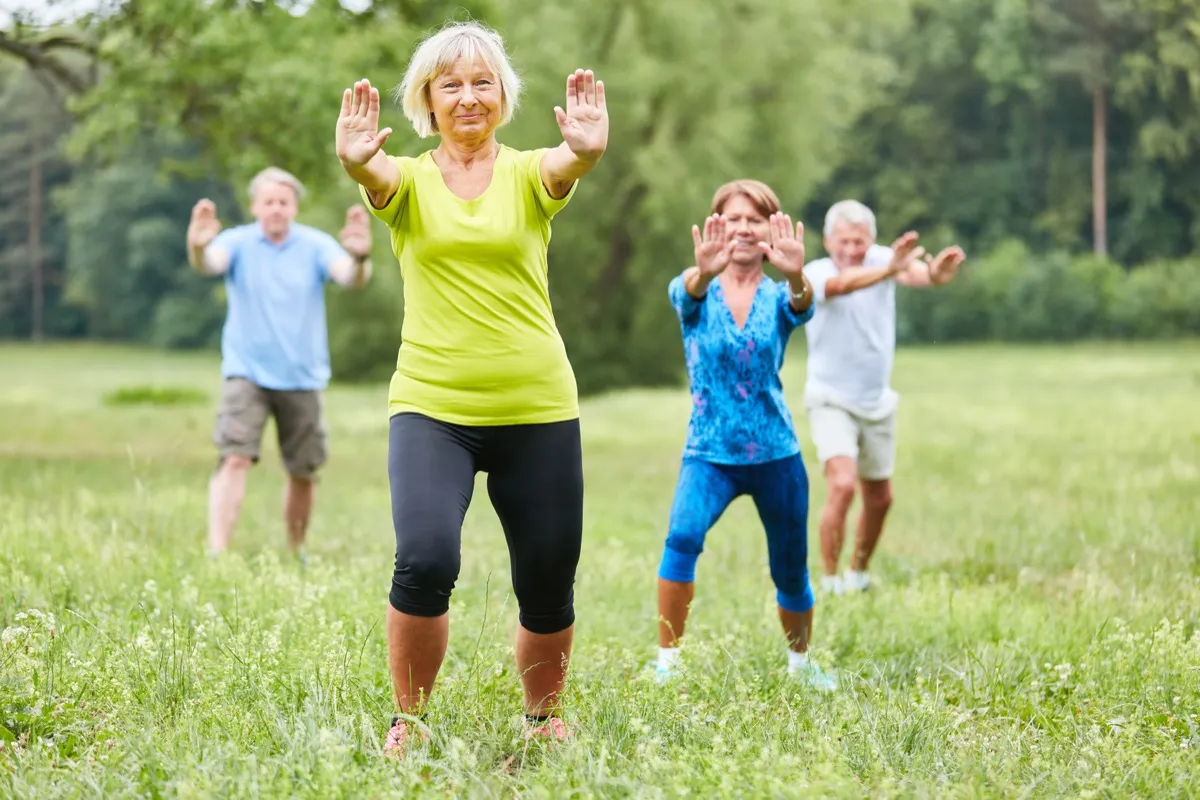7 Surprisingly Easy Things That Will Make You Feel Happier, According to Science
Boost your mood with these simple, science-backed tips.

For many of us, the pursuit of happiness is a life-long endeavor—one in which feelings of joy, satisfaction, or contentment can feel fleeting or just out of reach. Yet science shows there are simple and tangible ways to cultivate happiness and promote better emotional wellbeing. By establishing certain mood-boosting habits in your day to day life, you may be able to incrementally grow your feelings of happiness and embrace a more emotionally fulfilling life. Read on to learn which seven surprisingly easy things can make you feel happier, starting today.
READ THIS NEXT: The Top 5 Signs You Found the Love of Your Life, According to Relationship Experts.
1
Talking to strangers

Staying socially connected to friends and family members is linked with better mental health and well-being. However, recent research shows that it's not just your core group of contacts that enrich your life. According to a 2022 study conducted by Harvard Business School doctoral students, talking to strangers is also important if you're looking to boost your mood.
The researchers coined a term, "relational diversity," to describe the two relationship factors that lead to a happier mood: richness and evenness. The "richness" of one's relationships refers to whether someone interacts with people of various levels of closeness (family members, friends, acquaintances, and strangers). "Evenness" refers to how evenly distributed their interactions are across these groups.
"The more relationship categories they talk to in a day and the more even their conversations are across those categories, the happier they are," explained Hanne Collins, a PhD student who co-authored the study, while speaking with NPR.
READ THIS NEXT: 8 "Small But Toxic" Things to Stop Saying to Your Partner, According to Therapists.
2
Volunteering

Performing acts of kindness or volunteering can be another easy way to make you feel happier in your everyday life. "Research has found that participation in voluntary services is significantly predictive of better mental and physical health, life satisfaction, self-esteem, happiness, lower depressive symptoms, psychological distress, and mortality and functional inability," confirms a 2018 study published in the journal BMC Public Health.
According to the Mayo Clinic, there are several reasons that giving back can lead to increased levels of happiness. Their experts say that volunteering provides an opportunity to nurture relationships and gives people a sense of meaning and purpose—both of which can help reduce stress and improve mood.
3
Practicing gratitude

Gratitude, or the practice of expressing appreciation for the things you value in your life, can also greatly increase your level of happiness, science suggests. "An existing body of research supports an association between gratitude and an overall sense of well being," says a 2010 study published in the journal Psychiatry.
In fact, researchers from the University of California, Davis (via Harvard Health Publishing) conducted an experiment in which study subjects were asked to keep a weekly journal for a period of 10 weeks. The subject pool was divided into three groups: one that was instructed to write about things they were grateful for, a second instructed to write about the things that bothered them, and a third instructed to write about any events that had affected them for better or worse. At the end of the study, those who had kept a gratitude journal reported more optimism and happiness than subjects in the other two groups.
4
Spending time in nature

Spending some time in the great outdoors is another easy way to feel happier, research shows. In a 2014 study published in the journal Frontiers in Psychology, "Those who are more connected to nature tended to experience more positive affect, vitality, and life satisfaction compared to those less connected to nature."
In fact, several studies have directly compared the experience of walking in natural environments to walking in urban environments. Overwhelmingly, these studies have shown that walking in nature is more closely linked with reduced anxiety, stress, and rumination.
5
Taking baths

For many of us, there's nothing quite as soothing as slipping into a hot bath at the end of a stressful day. Now, research backs up the notion that regular baths can indeed improve both your physical and mental health.
In particular, a 2018 study published in the journal Evidence Based Complementary Alternative Medicine found that those who took immersion baths every day for two weeks were less likely to report fatigue, stress, pain, and poor mood than they were during a control period, during which they took showers. "Scores were lower for stress, tension-anxiety, anger-hostility, and depression-dejection" when the subjects bathed, the researchers wrote.
For more health news sent directly to your inbox, sign up for our daily newsletter.
6
Exercising regularly

The physical benefits of regular exercise are hard to overstate. According to the Centers for Disease Control and Prevention (CDC), getting at least 150 minutes of moderate-intensity physical exercise can help you maintain a healthy weight, lower your risk of chronic illness, strengthen your bones and muscles, and increase longevity.
However, the benefits don't stop there: exercise can also make you much happier, according to a 2020 study in the International Journal of Environmental Research and Public Health. The researchers behind that study looked at how exercise impacts mental well-being for young, middle-aged, and older adults. "After controlling for demographic characteristics, participants with high and moderate activity levels had significantly higher life satisfaction and happiness than those with a low activity level across the total population and the three age groups," they wrote.
7
Getting a good night's sleep

Finally, rest is key if you want to feel happier. In fact, many studies have found a bidirectional relationship between poor sleep and depression—meaning they each contribute to driving the unhealthy cycle of restlessness and low mood. Though the CDC recommends that adults get between seven to nine hours of sleep per night, at least 35 percent of Americans average fewer than seven hours.
To get a better night's rest, be sure to follow a consistent bedtime routine that promotes good sleep hygiene. If you still can't sleep, be sure to speak with your doctor about your insomnia to determine whether there may be an underlying medical cause.
Best Life offers the most up-to-date information from top experts, new research, and health agencies, but our content is not meant to be a substitute for professional guidance. When it comes to the medication you're taking or any other health questions you have, always consult your healthcare provider directly.
- Source: https://www.pnas.org/doi/10.1073/pnas.2120668119
- Source: https://www.ncbi.nlm.nih.gov/pmc/articles/PMC5504679/
- Source: https://www.mayoclinichealthsystem.org/hometown-health/speaking-of-health/3-health-benefits-of-volunteering
- Source: https://www.health.harvard.edu/healthbeat/giving-thanks-can-make-you-happier
- Source: https://www.ncbi.nlm.nih.gov/pmc/articles/PMC4157607/
- Source: https://pubmed.ncbi.nlm.nih.gov/29977318/
- Source: https://www.cdc.gov/physicalactivity/basics/pa-health/index.htm
- Source: https://www.ncbi.nlm.nih.gov/pmc/articles/PMC7369812/
- Source: https://pubmed.ncbi.nlm.nih.gov/35596680/





















